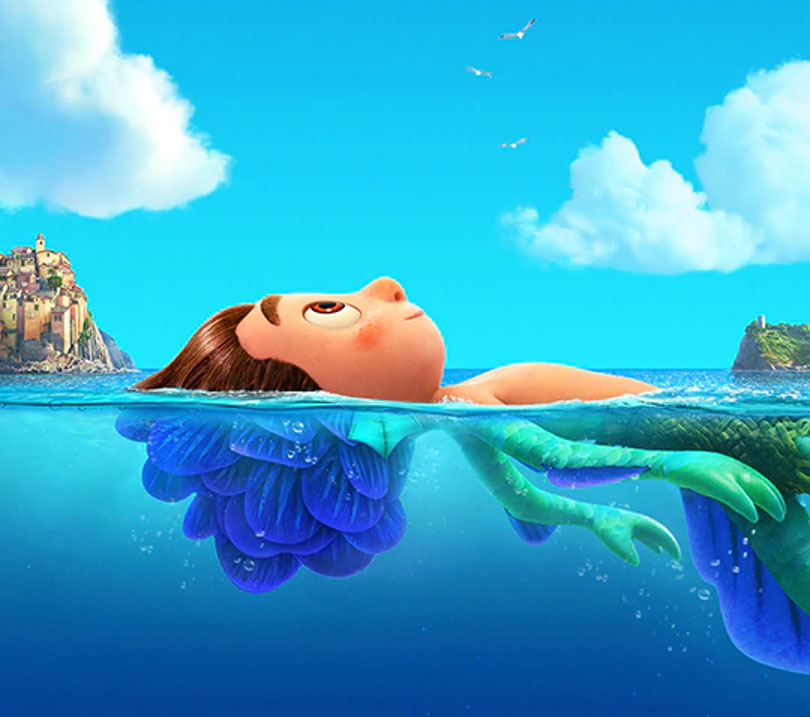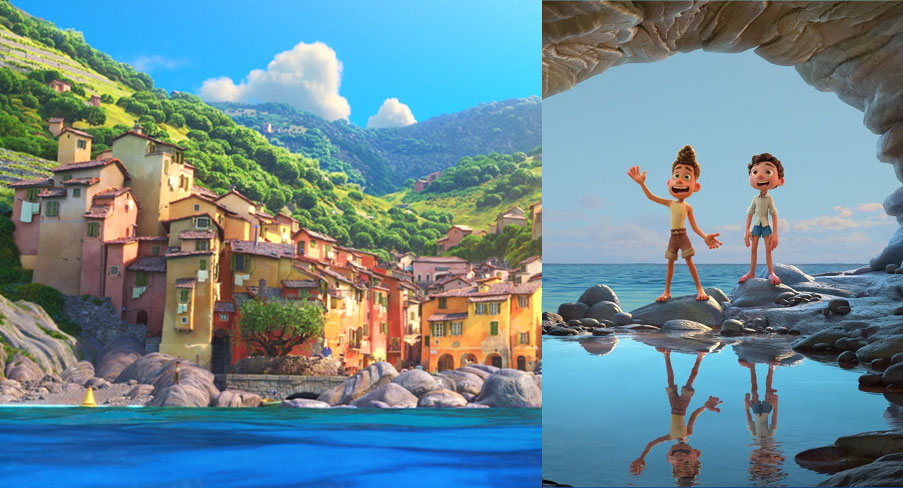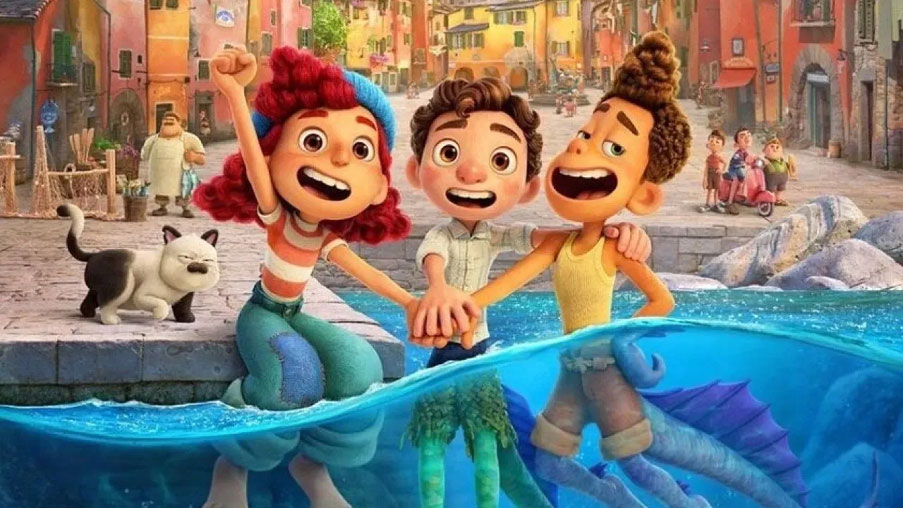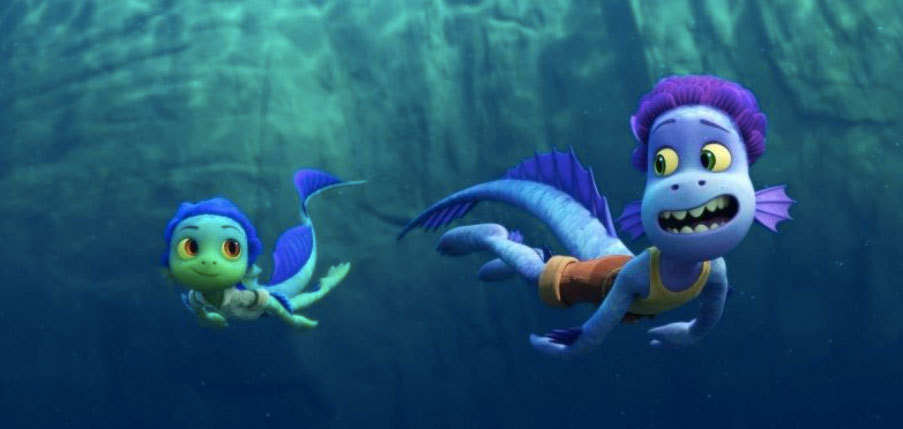Photo Credit- disney.co.uk
Luca centres two young mermaid-like ‘sea monsters’ as they venture to a human town on the surface of the Italian Riviera. This Pixar film is definitely worth a watch, as it’s included in a regular Disney+ subscription and is overall charming and entertaining.
I grew up watching Pixar movies and have become a slight Pixar nerd, appreciating their films for a quality we’ll call ‘Pixar-ness’. Pixar-ness is everything that makes a film just feel like Pixar, no matter how different the films are from each other. It’s hard to put your finger on exactly with makes a Pixar film feel like one, but broadly it’s the signature stunning animation style, a relatable subject matter which evokes genuine emotion (even for adult viewers), a non-predictable storyline, and an immersive world built from an innovative concept. Luca hits some of these points to an extent and is certainly fun, but does not live up to the standard of Pixar’s classics.
With a few spoilers, this review will explain why it’s a great movie, but doesn’t quite live up to Pixar’s reputation and wasted its potential in some aspects.
Animation Style
Luca is set against the picturesque, colourful backdrop of the Italian Riviera. Its trees and water aren’t quite as hyper realistic as those praised in The Good Dinosaur, but the stylised approach still works and mimics the spirit of this beautiful coast, to the point it’s making viewers hanker for an Italian getaway. It’s a true shame this animation went straight to Disney+ and was never witnessed on the big screen.
The actual characters however, look generic in a way which Pixar characters usually don’t, at least in human form. Their polished roundness more closely resembles the style of Illumination Studios, and whereas its cuteness is appealing, it’s been overused by arguably more cynical or corporate studios for this very reason.
Subject Matter
Pixar films have mostly centred around adult characters who encounter mature issues in a family-friendly, whimsical setting. Soul, for example, centres middle-aged jazz teacher Joe as he discovers the meaning of life, with healthy doses of humour and imagination. This redefines the ‘family film’ genre to be genuinely enjoyed by the entire family, as opposed to a film heavily geared toward children whilst adults passively watch along.
Pixar has centred child characters whilst still upholding this ideal in the past, for example Coco manages to thoughtfully tackle the subject matter of remembering the dead whilst following the twelve-year-old Miguel. Luca falls short of this. The moral is to not judge a book by its cover and to not let others stop you following your dreams. This is wonderful for a children’s film, but it’s too simplistic to provide any genuine value to an adult viewer, and is overall clunkily done. Take for example, the moral explained by the movie itself, presumably in case we didn’t notice.
“Some people, they’ll never accept him. But some will and he seems to find the good ones.”
Pixar is not one to choose a simple, easy moral and portray it so heavy-handedly. This one, therefore, leans toward children as its demographic as opposed to families, and lacks in ‘Pixar-ness’.
Aside from this, it can be genuinely heart-warming at times. One particularly emotional moment was the reveal that Alberto had been left with no parents, presumably entirely alone, for a long time before he met Luca. This paid off when he found a new father figure in gentle giant Massimo, but this was largely overshadowed by Luca’s arc of having overprotective parents, which was overall far less interesting.
Storyline
The storyline of Luca follows three friends as they train to win a race of swimming, cycling, and eating pasta. It’s very fun, and makes for an uplifting watch. However, most plot points can easily be predicted. Once again, this is par for the course in a children’s film, or even other genres I personally enjoy such as romcoms and superhero films.
The predictability of these genres makes us feel safe, and this appeals to many especially in hard times. When we’re stressed, we don’t want to watch anything with a dark, intricate, shocking plot, and so Luca makes for a genuinely sweet comfort film. In this way, predictableness limits Luca’s ‘Pixar-ness’, but doesn’t necessarily make it worse.
Concept and Immersion
Luca wastes a huge amount of potential by reinventing the mermaid world, only to have its characters spend the majority of their time in human form.
We see very little of Luca’s life as a sea monster before he ventures to the surface, and audiences are teased with creative elements of his world such as herding shoals of fish as opposed to sheep. Oddly, a few under water characters are even named only to never be seen again. The sea monster concept was what made this film unique, and yet was largely wasted.
One easy way to flesh out the sea monster world may have been found in Luca’s family’s backstory. For example, it is never explained why Luca’s mother seems to be far more concerned about the dangers of the surface than other family members. Did something happen to her? I wanted to learn more about Luca’s world before following him into ours.
Aside from the sea monster concept, Luca’s setting is specifically Italian. Whereas some general Italian culture is represented, this is unnecessarily limited. Needlessly, its main characters are given North American accents, and stray from these only to pronounce random phrases against a setting with so much more potential.
Overall, Luca allows a viewer to become immersed with various charming fish themed jokes and the boys’ misunderstandings of and fascination with the human world, often reminiscent of The Little Mermaid.
This immersion is occasionally broken by mildly annoying inconsistencies which would have been ironed out had this been one of Pixar’s best. For example, sea monsters usually change into human form when completely dry, with each body part changing individually when wet. However, at other points, they turn human the second they are no longer submerged in water. Fortunately, this does not show lazy writing as the slower change into human form only ever inconveniences the characters, forcing them to frantically hide and dry themselves off.
Luca is great, but for various reasons feels different to a Pixar film. Don’t go in expecting anything similar to the classics, but it’s safe to expect a thoroughly fun bit of summer escapism with some genuinely charming moments.











